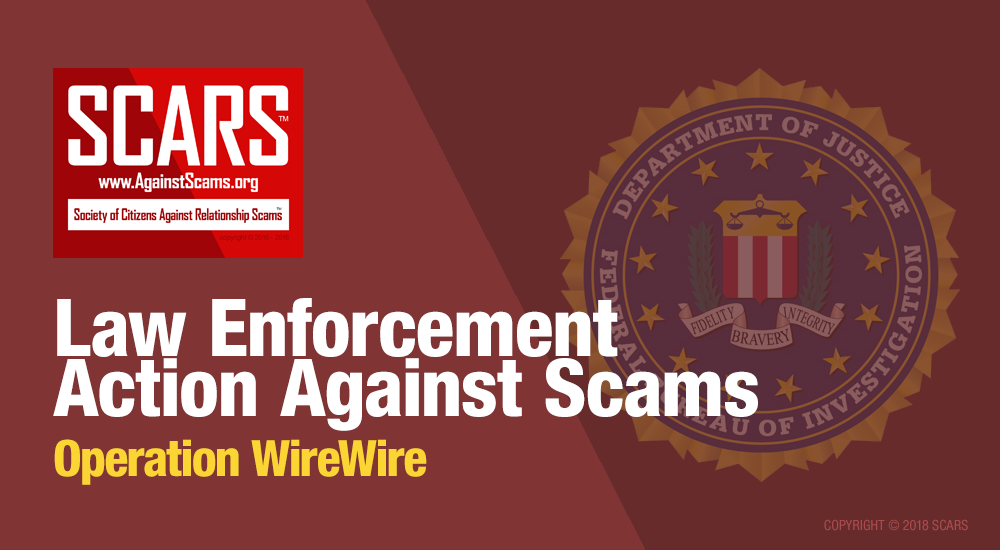SCARS™ Law Enforcement Action Against Scams: Operation WireWire
The United State Federal Bureau of Investigation (FBI) Working with Partner Agencies Domestically and Around the World in a Large-Scale Coordinated Effort to Dismantle International BEC Scams
WireWire Operation Background:
United States Federal authorities—including the Department of Justice and the FBI—announced in June 2018 the major coordinated law enforcement effort to disrupt international business e-mail compromise (BEC) schemes that are designed to intercept and hijack wire transfers from businesses and individuals.
“We will continue to work together with our law enforcement partners around the world to end these fraud schemes and protect the hard-earned assets of our citizens.”
FBI Director Christopher Wray
Operation WireWire—which also included the Department of Homeland Security, the Department of the Treasury, and the U.S. Postal Inspection Service—involved a six-month sweep that culminated in over two weeks of intensified law enforcement activity resulting in 74 arrests » in the U.S. and overseas, including 42 in the U.S., 29 in Nigeria, and three in Canada, Mauritius, and Poland. The operation also resulted in the seizure of nearly $2.4 million and the disruption and recovery of approximately $14 million in fraudulent wire transfers.
A number of cases charged in this operation involved international criminal organizations that defrauded small- to large-sized businesses, while others involved individual victims who transferred high-dollar amounts or sensitive records in the course of business. The devastating impacts these cases have on victims and victim companies affect not only the individual business but also the global economy. Since the Internet Crime Complaint Center (IC3) began formally keeping track of BEC and its variant, e-mail account compromise (EAC), there has been a loss of over $3.7 billion reported to the IC3. [don’t forget www.Anyscams.com as well]
BEC, also known as cyber-enabled financial fraud, is a sophisticated scam that often targets employees with access to company finances and trick them—using a variety of methods like social engineering and computer intrusions—into making wire transfers to bank accounts thought to belong to trusted partners but instead belong to accounts controlled by the criminals themselves. And these same criminal organizations that perpetrate BEC schemes also exploit individual victims—often real estate purchasers, the elderly, and others—by convincing them to make wire transfers to bank accounts controlled by the criminals.
Foreign citizens perpetrate many of these schemes, which originated in Nigeria but have spread throughout the world.
During Operation WireWire, U.S. law enforcement agents executed more than 51 domestic actions, including search warrants, asset seizure warrants, and money mule warning letters. And local and state law enforcement partners on FBI task forces across the country, with the assistance of multiple district attorney’s offices, charged 15 alleged money mules for their roles in defrauding victims.
The role of money mules » witting or unwitting, in BEC schemes is very important—they are used to receive the stolen money and then transfer the funds as directed by the fraudsters. The mules usually keep a fraction of the money for their trouble.
The announcement highlighting this recent surge in law enforcement resources targeting BEC schemes “demonstrates the FBI’s commitment to disrupt and dismantle criminal enterprises that target American citizens and their businesses,” according to FBI Director Christopher Wray.
And he added, “We will continue to work together with our law enforcement partners around the world to end these fraud schemes and protect the hard-earned assets of our citizens. The public we serve deserves nothing less.”
Learn More About BEC – Business Email Compromise Scams:
PLEASE SHARE OUR ARTICLES WITH YOUR CONTACTS
HELP OTHERS STAY SAFE ONLINE
SCARS™ Team
A SCARS Division
Miami Florida U.S.A.
TAGS: Scam News, News About Scams, News About Scammers, Global Scamming News, United States Department of Justice, Federal Bureau of Investigation, Operation Wire Wire, WireWire, FBI, Law Enforcement Action Against Scams
The Latest SCARS|RSN Posts
FIND MORE SCAM NEWS
«SCAMCRIME.COM»
CHAT WITH SCARS™
«CLICK HERE»
END
MORE INFORMATION
– – –
Tell us about your experiences with Romance Scammers in our
« Scams Discussion Forum on Facebook »
– – –
FAQ: How Do You Properly Report Scammers?
It is essential that law enforcement knows about scams & scammers, even though there is nothing (in most cases) that they can do.
Always report scams involving money lost or where you received money to:
- Local Police – ask them to take an “informational” police report – say you need it for your insurance
- Your National Police or FBI « www.IC3.gov »
- The SCARS|CDN™ Cybercriminal Data Network – Worldwide Reporting Network « HERE » or on « www.Anyscam.com »
This helps your government understand the problem, and allows law enforcement to add scammers on watch lists worldwide.
– – –
Visit our NEW Main SCARS Facebook page for much more information about scams and online crime: « www.facebook.com/SCARS.News.And.Information »
To learn more about SCARS visit « www.AgainstScams.org »
Please be sure to report all scammers « HERE » or on « www.Anyscam.com »
Legal Notices:
All original content is Copyright © 1991 – 2020 SCARS All Rights Reserved Worldwide & Webwide. Third-party copyrights acknowledge.
SCARS, RSN, Romance Scams Now, SCARS|WORLDWIDE, SCARS|GLOBAL, SCARS, Society of Citizens Against Relationship Scams, Society of Citizens Against Romance Scams, SCARS|ANYSCAM, Project Anyscam, Anyscam, SCARS|GOFCH, GOFCH, SCARS|CHINA, SCARS|CDN, SCARS|UK, SCARS Cybercriminal Data Network, Cobalt Alert, Scam Victims Support Group, are all trademarks of Society of Citizens Against Relationship Scams Incorporated.
Contact the law firm for the Society of Citizens Against Relationship Scams Incorporated by email at legal@AgainstScams.org













Leave A Comment